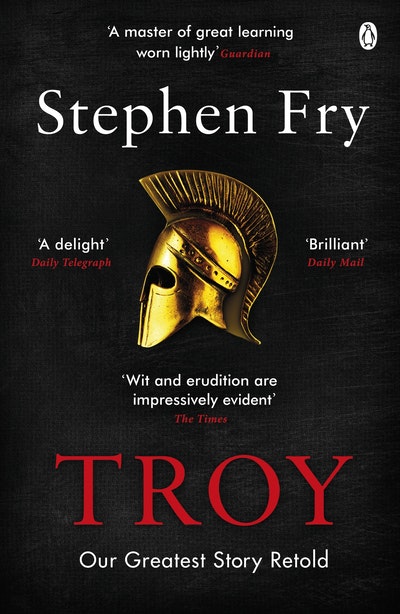- Published: 20 July 2021
- ISBN: 9781405944465
- Imprint: Michael Joseph
- Format: Paperback
- Pages: 432
- RRP: $26.99
Troy
Our Greatest Story Retold
Extract
To understand Troy’s end we must understand her beginning. The background to our story has many twists and turns. A host of place names, personalities and families enter and exit. It is not necessary to remember every name, every relationship of blood and marriage, every kingdom and province. The story emerges and the important names will, I promise, stick.
All things, Troy included, begin and end with ZEUS, the King of the Gods, Ruler of Olympus, Lord of Thunder, Cloud-Gatherer and Bringer of Storms.
Long, long ago, almost before the dawn of mortal history, Zeus consorted with Electra, a beautiful daughter of the Titan Atlas and the sea nymph Pleione. Electra bore Zeus a son, DARDANUS, who travelled throughout Greece and the islands of the Aegean searching for a place in which he could build and raise his own dynasty. He alighted at last on the Ionian coast. If you have never visited Ionia, you should know that it is the land east of the Aegean Sea which used to be called Asia Minor, but which we know as Turkish Anatolia. The great kingdoms of Phrygia and Lydia were there, but they were already occupied and ruled over, so it was in the north that Dardanus settled, occupying the peninsula that lies below the Hellespont, the straits into which Helle fell from the back of the golden ram. Years later JASON would sail through the Hellespont on his way to find the fleece of that ram. The lovestruck Leander would swim nightly across the Hellespont to be with Hero, his beloved.*
The city Dardanus established was called – with little imagination and less modesty – Dardanus, while the whole kingdom took on the name Dardania.** Following the founder king’s death, Ilus, the eldest of his three sons, ruled – but he died childless, leaving the throne to his brother, the middle son, ERICHTHONIUS.***
The reign of Erichthonius was peaceful and prosperous. In the lee of Mount Ida his lands were fed by the waters of the benign river gods Simoeis and Scamander, who blessed the land of Dardania with great fertility. Erichthonius grew to become the richest man in the known world, famous for his three thousand mares and their countless foals. Boreas, the North Wind, took the form of a wild stallion and fathered a remarkable race of horses by the filly foals of Erichthonius’s herd. These colts were so agile and light of foot they could gallop through fields of corn without bending a stalk. So they say.
Horses and riches: always, when we talk of Troy, we find ourselves talking of wondrous horses and uncountable riches.
FOUNDATION
After the death of Erichthonius, his son TROS succeeded to the throne. Tros had a daughter, Cleopatra, and three sons, ILUS (named in honour of his great-uncle), Assaracus and GANYMEDE. The story of Prince Ganymede is well known. His beauty was so great that Zeus himself was seized by an overmastering passion for him. Taking the form of an eagle, the god swooped down and bore the boy up to Olympus, where he served as Zeus’s beloved minion, companion and cupbearer. To compensate Tros for the loss of his son, Zeus sent HERMES to him, bearing the gift of two divine horses, so swift and light they could gallop over water. Tros was consoled by these magical animals and by Hermes’ assurance that Ganymede was now and – by definition always would be – immortal.****
It was Ganymede’s brother Prince Ilus who founded the new city that would be named Troy in Tros’s honour. He won a wrestling match at the Phrygian Games, the prize consisting of fifty youths and fifty maidens, but – more importantly – a cow. A very special cow that an oracle directed Ilus to use for the founding of a city.
‘Wherever the cow lies down, there shall you build.’
If Ilus had heard the story of CADMUS – and who had not? – he would have known that Cadmus and Harmonia, acting in accordance with instructions from an oracle, had followed a cow, and waited for the animal to lie down as an indication of where they were to build what would become Thebes, the first of the great city states of Greece. It may seem to us that the practice of allowing cows to choose where a city should be built is arbitrary and bizarre, but perhaps a little reflection should tell us that it is not so strange after all.
* The stories of Helle, the golden ram and Jason can be found in Heroes (page 185), and the tragedy of Hero and Leander in Mythos (page 359). Even later in history those same straits, now called the Dardanelles after Dardanus, were the source of terrible fighting in and around the peninsula city that the Greeks called Kalli Polis (Beautiful City), which over time had turned into the name Gallipoli.
** In some versions Dardanus annexed, absorbed or even invaded an existing kingdom that had been founded by King Teucer, a son of the river god SCAMANDER and the oread, or mountain nymph, Idaea. This Teucer is not to be confused with the bowman of the same name whom we shall meet later. In later poetry and chronicles Trojans were sometimes called Teucrians.
*** The youngest of Dardanus’s three sons, Idaeus, gave his name to Mount Ida, the greatest of the peaks lying to Dardania’s south.
**** Indeed, the cupbearer lives two immortal lives in the night sky: as the constellation Aquarius, the Water-Carrier, and as a moon of his lover, Jupiter (the planets all take on the gods’ Roman names).
Troy Stephen Fry
Sunday Times bestsellers Mythos and Heroes have over a million sales: now comes Troy
Buy now